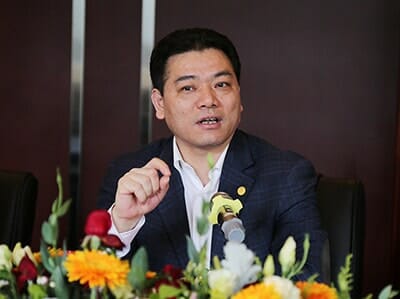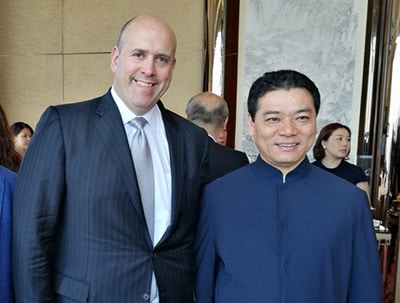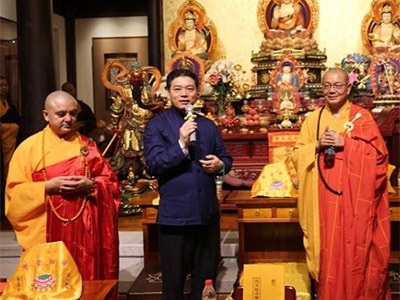
The Gangtai International Center was planned to create a new Taizhou CBD in 2019
China’s real estate slowdown appears to be claiming yet another victim, as China Cinda Asset Management takes over a planned 300-metre tall skyscraper project in the Zhejiang provincial city of Taizhou.
The state-owned “bad asset bank” acquired the Gangtai International Center project — which was planned to include the tallest building in Zhejiang province — from privately held conglomerate Gangtai Group, local media revealed on Friday.
The asset disposal marks a setback for Gangtai, which hoped to build a global jewelry empire after acquiring a $269 million Italian luxury brand Buccellati in 2016.
China Cinda Wins the Rights to Zhejiang’s Tallest Building
The mining, jewelry and real estate conglomerate was forced to dispose of the trophy project in the Chinese third-tier city after lamenting the country’s “poor financial environment.” In June Gangtai, which also controls Shanghai-listed Gansu Gangtai Holding (Group) Co Ltd, had disclosed a liquidity shortage that called into question its ability to make good on RMB 1.47 billion ($215.21 million) in financial obligations coming due this year.
Shortly after that rescue plan was revealed, Gangtai sold 100 percent of its equity in Taizhou Botai Real Estate Co., Ltd. to China Jingu International Trust, backed by China Cinda, on June 27th, giving the bad asset manager control of what would be the tallest building in for the eastern China city of six million people, and in all of Zhejiang province.
The planned project includes a 300-metre-tall tower flanked by a pair of 170-metre-tall buildings and another six 100-metre-tall towers. According to Gangtai’s website, when completed the 550,000 square metre project would create a new central business district in Taizhou. The project would bring to the city, which is best-known commercially as the hometown of car manufacturer Geely, a commercial complex more than four times the size of the landmark Bank of China Tower in Hong Kong’s Central district. Despite the presence of the car maker, Zhejiang’s Taizhou is frequently confused with the similarly named Taizhou in neighbouring Jiangsu province.
The group spent around RMB 540 million to purchase the Gangtai International Center site in September 2013, with plans to invest RMB 5.5 billion to complete the complex by 2019.
Developer Stock Frozen For Over One Month

Gangtai chairman Xu Jiangang made headlines for his purchase of a $269M Italian jewelry firm
Taizhou Botai, which controls the skyscraper project, has recently been listed by the Chinese authorities as having “abnormal business operations”, indicating the company was experiencing financial difficulties or was poorly managed. This came as trading of Gansu Gangtai Holding Group was suspended on the Shanghai Stock Exchange on June 11th, with the company’s equity frozen since then.
In addition to the Taizhou project sale, local media reports also revealed on Friday that Gangtai had also sold property development company Shanghai Yi Liu, to Hangzhou Shangyong Trading Company Limited on June 14th.
Financial details of the sales have not been disclosed, and China Cinda Asset Management has not disclosed the reported project transaction to the Hong Kong stock exchange.
Asset Sales Follow Overseas Acquisitions
Gangtai Group announced an asset reorganisation plan to the Shanghai stock exchange on July 23rd which mapped out a scheme to sell off assets including developed real estate and land over the next year in an effort to meet its financial obligations. Before the end of the current quarter the company needs to resolve RMB 715 million in debt, with another RMB 754 million in obligations coming due in the fourth quarter.

Gangtai’s Xu Jiangang hanging out with then Goldman Sachs president Harvey Schwartz in Shanghai last year
In March of this year Gangtai Group issued $100 million in senior notes to international investors at an interest rate of 9.75 percent. China’s Haitong International Securities was the manager and bookrunner for the senior notes, which are due in March of 2019.
Gangtai’s current financial distress brings the metals, jewelry and real estate conglomerate back into the spotlight after it first grabbed international headlines in 2016 with its purchase of an 85 percent stake in Italian luxury jewelry maker Buccellati in a deal that valued the Milan company at 230 million euros ($269 million).
In November last year Gangtai Group chairman presided over the opening of a Buccellati boutique in Shanghai’s Plaza 66 luxury mall and proclaimed a plan to open 88 stores globally in the next three to five years.
Now Gangtai, which was founded in Taizhou, is scaling back in its home base. The company, which is one of China’s largest gold jewelry distributors, controls some 22 gold mines said to have combined reserves of 150 metric tons, according to local media reports.
Gangtai Follows Through on Asset Sale Plan

Gangtai’s Xu has consulted a variety of experts to resolve the financial crisis
Like more famous companies such as HNA and Dalian Wanda, Gangtai appears to have been caught out by a Chinese government crackdown on credit to the real estate industry, which is adding to problems for a number of companies in the sector.
Earlier this month credit ratings agency Moody’s Investors Service predicted that Hong Kong-listed industrial developer Wuzhou International Holdings Limited would default on $300 million in offshore bonds after creditors filed suit against the company.
“Tighter financing controls, a slower sales market, slowing economy are all going to have an impact on developers, especially smaller and/or regional developers who are less likely to have diversified cash flows,” James Macdonald, head of China research at Savills, told Mingtiandi in emailed comments. He added that such companies “will be more exposed to changes in local market conditions and have limited access to alternative financing channels.”
Also this month, defaulting real estate developer Zhonghong Holdings attempted to sell its RMB 12.9 billion Ruyi Island project in Hainan to Kaisa Group Holdings, as it attempted to resolve overdue debts and interest obligations totalling around RMB 4.37 billion.
Gangtai Makes Plans to Stay Afloat
To help resolve its current crisis, Gangtai said in a statement that it was pledging shares in the company in return for loan extensions and withdrawing from foreign investment projects, in addition to its project sales.
The company acknowledged that, during the current “poor financial environment and the continuous suppression of credit lines by financial institutions,” it would likely be hit by short-term liquidity shortages.
The company indicated that it would close an additional asset sale by the end of August, and that the proceeds of its asset disposals would be used to pay down the company’s debt principal and interest.
Leave a Reply